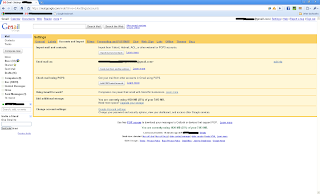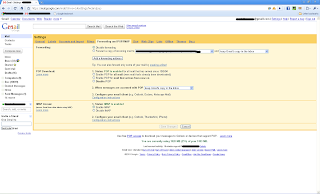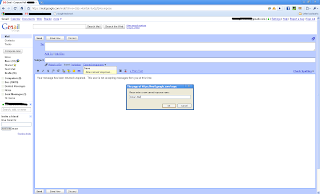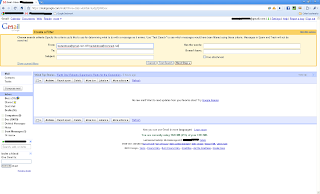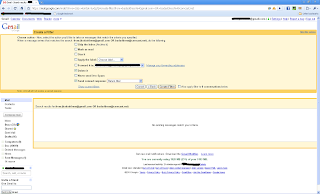I grew up in a tradition that had very hard and fast rules to who was in and who was out when it came to matters of being right with God. Those who went to churches with our common name, and interpreted the Bible the same way we interpreted the Bible, were in. Everyone else was out. I once heard a well known personality in our tribe ask the question, "If God can forgive a multitude of bad behavior, why can't he forgive any thread of bad theology?" His question resonated with my young mind.
As I have grown, my circle of influence has also grown. I certainly do not read the Bible through those lenses I was given as a child. I have been blessed by the thinking of many in the conservative tradition that I grew up a part of. I have been blessed by conservative voices outside of the tradition of my roots. I have been blessed by more progressive voices in the "mainline denominations" who have challenged many of the assumptions I was taught by the lenses our tradition read through. Much to the chagrin of some, I have been blessed even by the liberal theologians. In totality I have seen that something of the nature, purpose, and mission of Jesus comes through all these voices. I have learned that since as Friedrich Beuchner says, "All theology is autobiographical" a piece of God is revealed through how each person and heritage interprets God through their story.
A common thread that I seem to hear over and over is the thread of Nicea. The common groundwork in so many ecumenical discussions is affirmation of the Nicene creed. For those of you unfamiliar with creeds let me give you the breif overview.
First Creed: Jesus Is Lord
Apostles Creed: I believe in God, the Father almighty, creator of heaven and earth. I believe in Jesus Christ, his only Son, our Lord, who was conceived by the Holy Spirit, born of the Virgin Mary, suffered under Pontius Pilate, was crucified, died, and was buried; he descended into hell. On the third day he rose again; he ascended into heaven, he is seated at the right hand of the Father, and he will come to judge the living and the dead. I believe in the Holy Spirit, the holy catholic Church, the communion of saints, the forgiveness of sins, the resurrection of the body, and the life everlasting. Amen.
Nicene Creed: I believe in one God the Father Almighty, Maker of heaven and earth, And of all things visible and invisible: And in one Lord Jesus Christ, the only-begotten Son of God, Begotten of his Father before all worlds, God of God, Light of Light, Very God of very God, Begotten, not made, Being of one substance with the Father, By whom all things were made; Who for us men, and for our salvation came down from heaven, And was incarnate by the Holy Ghost of the Virgin Mary, And was made man, And was crucified also for us under Pontius Pilate. He suffered and was buried, And the third day he rose again according to the Scriptures, And ascended into heaven,And sitteth on the right hand of the Father. And he shall come again with glory to judge both the quick and the dead: Whose kingdom shall have no end. And I believe in the Holy Ghost, The Lord and giver of life, Who proceedeth from the Father and the Son, Who with the Father and the Son together is worshipped and glorified, Who spake by the Prophets. And I believe one Catholic and Apostolic Church. I acknowledge one Baptism for the remission of sins. And I look for the Resurrection of the dead, And the life of the world to come. Amen.
The "First Creed" is the common creed of the earliest church. The point here was not associated with divinity, but instead with authority. The creed stood in the face of the more common imperial credo, "Caeser is Lord." This creed put the followers of Jesus into a treasonous position. To follow Jesus was to commit high treason against the state. So the first creed of the church was merely ascent to participation in this insurgency. It was an identification for those who were living in the way of Jesus, with him as their new King.
Although it's origins seem largely unknown the Apostles Creed was commonly accepted and can be found in many early church writings dating from around 180 CE. By this time, this new creed had given up it's simplicity as an insurgency against the kingdoms of this world, now to outline a more rigorous religious structure. This creed had moved from participation in a revolt for an upside down kingdom, to a set of intellectual ascents. Broadly speaking, this creed however was still non trinitarian, and more aligned to seeing Jesus as the messiah prophesied about in the Jewish prophets who would rule on the throne of David.
Nicea however takes the language of the apostles creed and expands it further. Written under the request of Constantine, this was to intended to be a tool of the state. A great deal of language was added at this point from the previous creeds. Since I am not a scholar I will not begin to question whether we should or should not trust the motivations and outcomes of the Council of Nicea. I would refer anyone interested to spend more time studying the process and motivations behind Nicea.
Like those who reared me in my faith community, I am left considering which creed we hold to most firmly. I affirm the ideas of the creed from Nicea myself, but I question if ascent to a set of theological statements is remotely what the Jesus of the gospels would have envisioned when he talked about "Believe in Me." I personally can not use ascent to the ideas of Nicea as the measure of "following Jesus." I am too affected by the message he preached, by the actions he modeled, and by the consequences of his behavior, to let him be reduced to religous system. The Catholic theologian Hans Kung said, "Jesus came to initiate a kingdom, and all we have given him is a church" My affirmation of Nicea seems irrelevant if I am not following the Jesus Way.
This brings us to a particular soap box that I enjoy. This topic of his statement to "believe in me." There are two distinct ideas at work here. Let's look at these two ideas in the context of myself for a moment. The first idea is considers my existence. Since many of you have met me, and those who have not can see the outcome of my existence by the fruit of this post when I ask the question "Do You Believe In Me" you would probably answer yes that you believe I am real. Now let's consider the distinctly other way this question is asked. If I ask my wife, "Do You Believe In Me?" She is answering a completely different question. She is answering a question of trust that will greatly affect her life. I am asking her to trust me in the direction I am going that no matter the outcomes we see this direction will be a blessing for us together.
As example I dream of working in tutoring with homeless and high risk children. I also dream of moving to Southern Africa to live among AIDS orphans. These passions are in my radar because they among what it means for me to follow Jesus. So when I ask, "Do you believe in me?" I am asking her to invest and trust in one of these dreams, and follow me, despite the cost as I make it a reality.
The Apostles Creed and Nicene Creed answer the question of, "Do you believe in my existence?" The "First Creed" answers the question of "Do you believe in me enough to follow my dream?" I make decisions and move toward the future knowing Jesus is Lord, the king of a new kingdom, a kingdom that is inaugurated by resurrection and practices new creation. A kingdom where the last is first, and the banquet table is open to the unclean. A Kingdom where I am left to ask myself, "Am I following the Jesus Way?"
Luke 4:18-19 “The Spirit of the Lord is upon me, because he has anointed me to proclaim good news to the poor. He has sent me to proclaim release to the captives and the regaining of sight to the blind, to set free those who are oppressed, to proclaim the year of the Lord’s favor.”
Jesus is Lord! Let Jubilee be sounded
 The house has been closed up for the past three years and is most definitely not ready for occupancy. It needs new floors on the main floor. New bathroom fixtures will be necessary in many places. Our basement, which is currently two of the bedrooms and storage space will have to be gutted and redesigned as 3 bedrooms. At this point we have no plans to address the problems (other than broken pipes if necessary) on the top floor. We have mold to remove, walls to paint, and a kitchen to re-imagine. It is not an understatement to say our work is cut out for us.
The house has been closed up for the past three years and is most definitely not ready for occupancy. It needs new floors on the main floor. New bathroom fixtures will be necessary in many places. Our basement, which is currently two of the bedrooms and storage space will have to be gutted and redesigned as 3 bedrooms. At this point we have no plans to address the problems (other than broken pipes if necessary) on the top floor. We have mold to remove, walls to paint, and a kitchen to re-imagine. It is not an understatement to say our work is cut out for us.